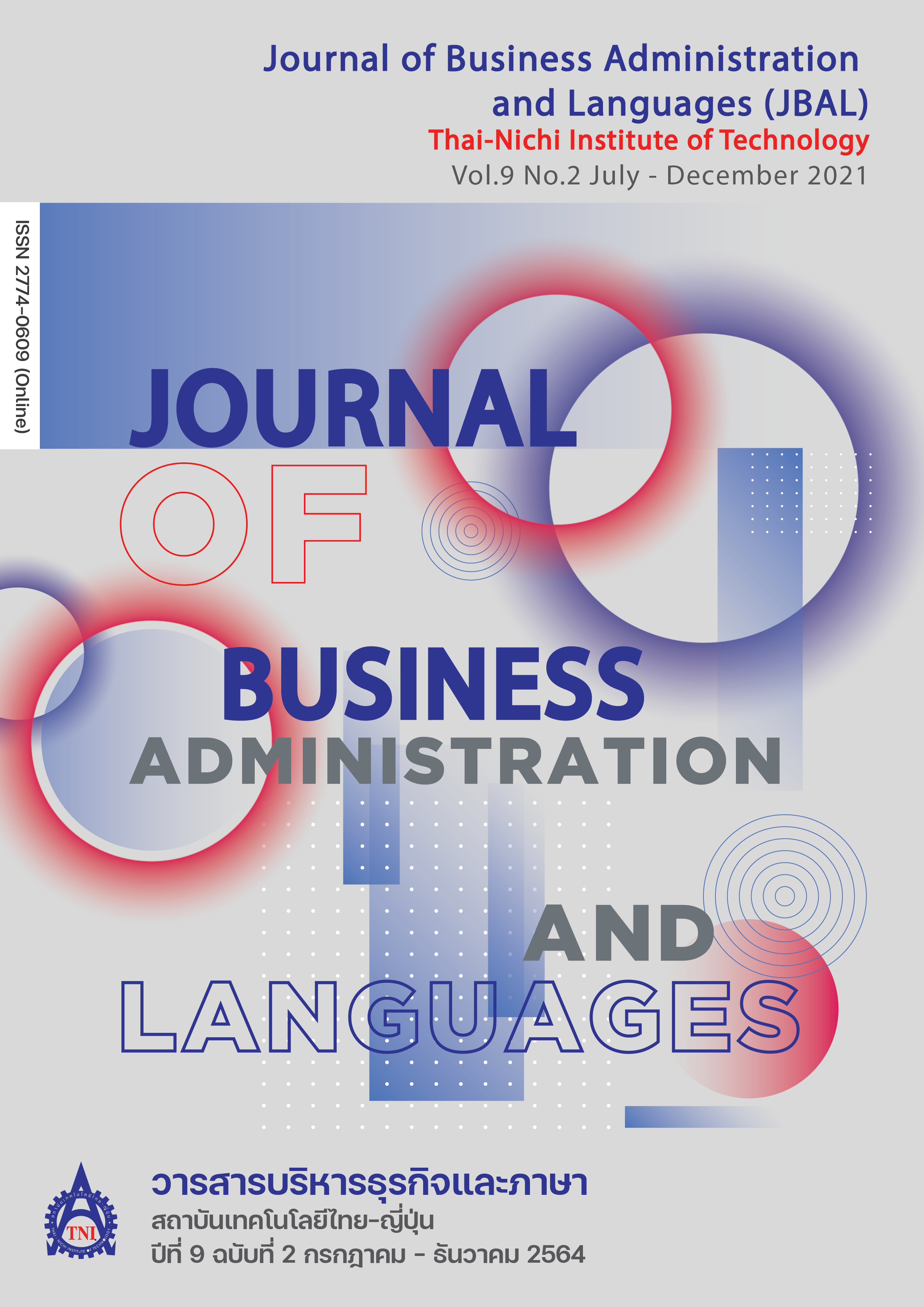The Pronunciation and Sound Production Drills to Improve Thai Speech of Chinese Students at Huachiew Chalermprakiet University
Main Article Content
Abstract
This research aims to construct exercises on pronunciation and sound production to improve Thai speech of Chinese students, Huachiew Chalermprakiet University based on the 80/80 standard and to compare achievement gained the pronunciation and sound production in Thai speech of Chinese students, both before and after the application. The sample consisted of 30 undergraduate Chinese students studying Thai major, chosen by purposive sampling. The instruments used were exercises and test. The method of educational research was experimental research by giving a pre-test and post-test after students were given an exercise. The data were analyzed by finding out the efficiency of E1/E2 and the dependent t-test.
The results of this study revealed that 1) exercises on pronunciation and sound production to improve Thai speech of Chinese students at Huachiew Chalermprakiet University had an efficiency of about 91.17/80.83 which means that the exercises are efficient and students can improve the skill and 2) achievement gained of the pronunciation and sound production in Thai speech of Chinese students had statistically higher scores than before using the 0.01 level of significance.
Article Details
Article Accepting Policy
The editorial board of Thai-Nichi Institute of Technology is pleased to receive articles from lecturers and experts in the fields of business administration, languages, engineering and technology written in Thai or English. The academic work submitted for publication must not be published in any other publication before and must not be under consideration of other journal submissions. Therefore, those interested in participating in the dissemination of work and knowledge can submit their article to the editorial board for further submission to the screening committee to consider publishing in the journal. The articles that can be published include solely research articles. Interested persons can prepare their articles by reviewing recommendations for article authors.
Copyright infringement is solely the responsibility of the author(s) of the article. Articles that have been published must be screened and reviewed for quality from qualified experts approved by the editorial board.
The text that appears within each article published in this research journal is a personal opinion of each author, nothing related to Thai-Nichi Institute of Technology, and other faculty members in the institution in any way. Responsibilities and accuracy for the content of each article are owned by each author. If there is any mistake, each author will be responsible for his/her own article(s).
The editorial board reserves the right not to bring any content, views or comments of articles in the Journal of Thai-Nichi Institute of Technology to publish before receiving permission from the authorized author(s) in writing. The published work is the copyright of the Journal of Thai-Nichi Institute of Technology.
References
Aphaphon Ditlek. (2012). Reading skill exercise of vocabulary in Thai textbook of Chinese students: A Case Study of Yunnan College of Tourism Vocation’s student in China. (in Thai). Retrieved from http://www.rpu.ac.th/Library_web/doc/RC_RR/2554_GenEd_Aphaphon.pdf
Aphon Jaithiang. (2007). Teaching Principles (4th ed.). (in Thai). Bangkok, Thailand: Odeon Store.
Chanika Khamphut. (2002). Studying Thai Language Usage of the Fourth Year Chinese Students Majoring in Thai Subject, Yunnan Institute of the Nationalities, People’s Republic of China. (in Thai). (Master’s thesis). Retrieved from https://archive.lib.cmu.ac.th/full/T/2545/thai1045ck_ch5.pdf
Eknaree Rangsoongnoen. (2014). Pronunciation Exercises for Problematic Thai Single Consonants and Vowels for Japanese Learners. (in Thai). (Master’s thesis). Retrieved from http://thesis.swu.ac.th/swuthesis/Tea_Tha_For_Lan/Eknaree_R.pdf
Jitladawan Srisunthornthai. (2015). Creating Reading Exercises of Thai Final Consonants for Chinese University Students. (in Thai). Retrieved from https://archives.mfu.ac.th/database/files/original/92e3bda11fd4053040fb5537dd7e8a32.pdf
Kanchana Prasai. (2014). Development of reading Thai Word-ending Combination Supplementary Exercises for Hill Tribe Student in Prathomsuksa I at Bann Rakphaendin School in Highland Area Under the jurisdiction of Office of Chiang Rai Primary Education Service Area 4. (in Thai). (Master’s thesis). Chiang Rai Rajabhat University, Chiang Rai, Thailand.
Malinee Jutharop. (1997). Teaching Psychology (3rd ed.). (in Thai). Bangkok, Thailand: Aksara Phiphat.
Nirada Wechayaluck. (2019). Learning management principles (2nd ed.). (in Thai). Bangkok, Thailand: Chulalongkorn University Press.
Rajamangala University of Technology Isan. (2008). Instruction Guide for Student-Centered Teaching Management. (in Thai). Nakhon Ratchasima, Thailand: Rajamangala University of Technology Isan.
Wandee Chuadnuch. (2006). Speaking in the mass communication professional. (in Thai). Bangkok, Thailand: Ramkhamhaeng University Press.
Wanida Treesawat. (2000). The Construction of Training Communication Arts Program Students in Speaking and Reading for Broadcasting Exercise According to the Rule of the Announcer Test of Public Relations Department. (in Thai). Ratchaburi, Thailand: Rajabhat Muban Chombung Institute.
Wilai Thamvaja. (2018). A Study of Problems in Thai Speech of Chinese Students, Huachiew Chalermprakiet University. (in Thai). Samutprakan, Thailand: Huachiew Chalermprakiet University.
Wei, Y. (2012). Error Analysis of Thai Pronunciation: A Case Study of Chinese Students Speaking Mandarin and Cantonese as the Mother Tongue. (in Thai). (Master’s thesis). Retrieved from https://archive.lib.cmu.ac.th/full/T/2555/thai41055yw_ch4.pdf
Yu, N. (2016). Construction of Exercises on Word-ending Pronunciation Protocols for Chinese Students at Chiang Rai Rajabhat University. (in Thai). (Master’s thesis). Chiang Rai Rajabhat University, Chiang Rai, Thailand.


